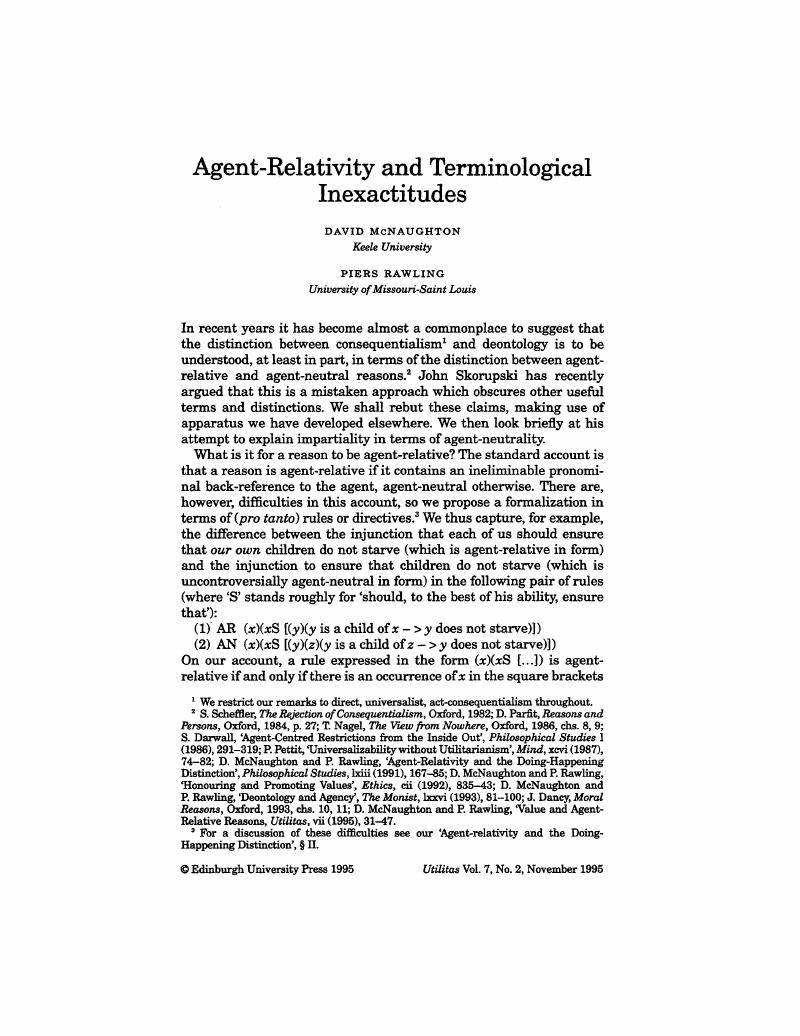Article contents
Agent-Relativity and Terminological Inexactitudes
Published online by Cambridge University Press: 26 January 2009
Abstract

- Type
- Discussion
- Information
- Copyright
- Copyright © Cambridge University Press 1995
References
1 We restrict our remarks to direct, universalist, act-consequentialism throughout.
2 Scheffler, S., The Rejection of Consequentialism, Oxford, 1982Google Scholar; Parfit, D., Reasons and Persons, Oxford, 1984, p. 27Google Scholar; Nagel, T., The View from Nowhere, Oxford, 1986, chs. 8, 9Google Scholar; Darwall, S., ‘Agent-Centred Restrictions from the Inside Out’, Philosophical Studies 1 (1986), 291–319CrossRefGoogle Scholar; Pettit, P., ‘Universalizability without Utilitarianism’, Mind, xcvi (1987), 74–82CrossRefGoogle Scholar; McNaughton, D. and Rawling, P., ‘Agent-Relativity and the Doing-Happening Distinction’, Philosophical Studies, lxiii (1991), 167–85CrossRefGoogle Scholar; McNaughton, D. and Rawling, P., ‘Honouring and Promoting Values’, Ethics, cii (1992), 835–43CrossRefGoogle Scholar; McNaughton, D. and Rawling, P., ‘Deontology and Agency’, The Monist, lxxvi (1993), 81–100CrossRefGoogle Scholar; Dancy, J., Moral Reasons, Oxford, 1993, chs. 10, 11Google Scholar; McNaughton, D. and Rawling, P., ‘Value and Agent- Relative Reasons, Utilitas, vii (1995), 31–47.CrossRefGoogle Scholar
3 For a discussion of these difficulties see our ‘Agent-relativity and the Doing-Happening Distinction’, § II.
4 Strictly, we need to add a rider to the effect that the AR rule is not equivalent in ethical content to any AN rule.
5 Nagel, , p. 165.Google Scholar
6 Terminology varies: Scheffler talks of agent-centred prerogatives (=options) and restrictions (=constraints).
7 The term ‘option’ is an unfortunate one, since it characterizes this alleged feature of morality from a consequentialist rather than a deontological perspective – one can only exercise one's option not to maximize the good where one's interests are threatened if one has a duty to maximize the good, which is just what many deontologists deny.
8 Our formalization enables us to capture the agent-relativity in all three of these areas. For details see ‘Value and Agent-relative Reasons’.
9 Skorupski, J., ‘Agent-Neutrality, Consequentialism, Utilitarianism … A Termino-logical Note’, Utilitas, vii (1995), 49–54.CrossRefGoogle Scholar
10 For details see ‘Honoring and Promoting Values’, 838. Skorupski also distinguishes the rational from the irrational egoist by claiming that the latter offers a reason which is agent-neutral but not universalizable; that is, he takes the fact that an act is of benefit to him as a reason for everyone to perform that act. ‘[T]he irrational egoist's principle ineliminably contains a rigid designator in a certain position in the reason-predicate’ (p. 50). We agree with Skorupski that properly formulated rules should not contain rigid designators.
11 There is nothing to prevent a deontologist adhering to both rules; he or she need not take the (clannist) view that only his or her children matter.
12 Skorupski might claim that deontology was only agent-relative ‘as such’ if all the rules in a deontological stystem had to be agent-relative. But this is clearly too strong; all deontologies include rules which are agent-neutral on any account.
13 We take it that his discussion of Browne, 's proposal in § 8Google Scholar is not intended as an argument to support his formalization as against ours. We agree with him that the position he calls ‘agent-relative teleology’ is confused, and we have argued as much in ‘Values and Agent-relative Reasons’. But deontology, which does not take the theory of value to be prior to the theory of the right, does not suffer from these confusions.
14 McNaughton, David makes these points about impartiality in Moral Vision, Oxford, 1988, pp. 167–8.Google Scholar
15 We are grateful to Brad Hooker for comments on an earlier version of this paper.
- 6
- Cited by




